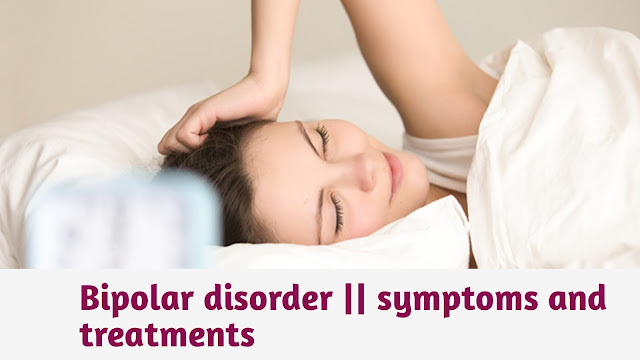Bipolar disorder || symptoms and treatments
Bipolar disorder:-
Bipolar disorder is a mental health condition characterised by alternating periods of depression and manic (elevated mood) episodes. It commonly begins in the mid-teenage years, but can occur at any time.
The depressive episodes of bipolar disorder unfortunately are very severe, more severe than normal depression, and often involve suicidal tendencies. As well sadly, most victims spend most of their time in the depressive stages.
Bipolar disorder is strongly hereditary, more so than simple depression.
There is a somewhat elusive idea that it's romantically not such a bad affliction to have as it tends to affect high achieving creative people like poets, musicians, artists etc, but this is far from the truth.
It is as disabling as schizophrenia, reduces the average life-expectancy by some 20 years, and is most disabling to both the sufferers and their loved ones.
Other causes include the abuse of drugs, severe emotional or physical trauma and the side effects of some medications especially broad spectrum modern antidepressants.
The actual diagnosis of bipolar disorder is somewhat complex, but it is based on a medical history alone and there need to be symptoms of alternating periods of depression (including loss of interest in pleasurable activities, decreased of increased appetite, weight gain or loss, increased of decreased sleep habits, suicidal attempts of tendencies and a feeling of utter hopelessness) and mania (including a reduced need for sleep, an elevated mood, delusions of grandeur, spending beyond ones means, marked weight loss and the abuse of mood altering drugs).
How do you know if you are bipolar?
There are many clues.
The first is to look at your own family and see if mood disorders run in the generations above.
Then you look for hypomanic v.s. manic mood episodes. If you only have depressive mood episodes, when most likely you have major depressive disorder, or unipolar depression (or colloquially called clinical depression).
Hypomania is a mood state where one’s mood is elevated or above than usual (normal mood is called euthymia). This is a mood state where you experience euphoria (however, of note, you can substitute euphoria with irritability and that still counts as an hypomanic or manic episode). While you experience hypomania, you have increase in energy, accompanied by increased goal directed activities (such as picking up extra projects at work and at school beyond your usual means), racing thoughts, increased speech pattern (talking more than usual and/or talking faster than usual), decrease needs for sleep (i.e. waking up after only 5 hours of sleep but still feel very energized), increase in sex drive, increase in spending money and overall increase in impulsive activities.
In general people with hypomania are still functional.
By contrast, mania is a mood state that is often very very much above hypomania or euthymia. In a manic mood state, the person with bipolar ceases to experience euphoria most likely; instead irritability is the predominant mood state. The person would then have a lot of increase in activities but these activities are not goal-directed any longer because he/she is so scattered brain. The person’s talking will be so fast and rapid that most people would have trouble understanding what the conversation is about. Sleep can decrease to as little as 1 or 2 hours a night only but yet that person is still bursting out with energy. Finally excessive spending and extremely impulsive behaviors are the norm.
For sure, people with mania are not functional and are often hospitalized.
If you have manic episodes, then it is not difficult to tell that you have bipolar disorder. If you only have hypomanic episodes, then it is more subtle and you might miss it.
Treatments of bipolar:-
The mainstay of treatment for bipolar disorder is medication based and the gold standard of treatment is the use of lithium, a mood stabiliser. Other medications used include Valproate, and Seroquil, and a handful of other drugs.
Cognitive behavioural therapy works well, but only in conjunction with medication.
The incidence of bipolar disorder has grown dramatically in Western populations, particularly in the past decade and it now affects some 5-7% of Western populations.
In terms of lost productivity, morbidity and mortality, it is arguably the greatest medical burden on our society, and treatment can be quite a challenge.
The good news is that it is often the drive behind most incredible talented and creative people and that with sound treatment and patience on behalf the therapist, the patient and their loved ones, sufferers can lead a very normal, fulfilling, and productive life.
It is important to involve a multidisciplinary approach to treatment involving the primary physician, a psychiatrist, a psychologist, a social worker and the family, and with such an approach, the prognosis can very bright indeed.














Post a Comment